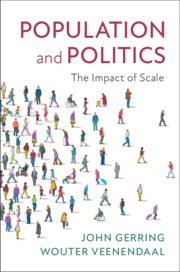Book contents
- Population and Politics
- Population and Politics
- Copyright page
- Contents
- Detailed Contents
- Figures
- Tables
- Preface
- Acknowledgments
- Part I Framework
- Part II Scale Effects
- 3 Cohesion
- 4 Representatives
- 5 Representativeness
- 6 Particularism
- 7 Participation
- 8 Contestation
- 9 Institutionalized Succession
- 10 Professionalism
- 11 Concentration
- 12 Intervention
- 13 Power
- 14 Civil Conflict
- 15 Other Outcomes
- Part III Conclusions
- Book part
- References
- Index
3 - Cohesion
from Part II - Scale Effects
Published online by Cambridge University Press: 14 May 2020
- Population and Politics
- Population and Politics
- Copyright page
- Contents
- Detailed Contents
- Figures
- Tables
- Preface
- Acknowledgments
- Part I Framework
- Part II Scale Effects
- 3 Cohesion
- 4 Representatives
- 5 Representativeness
- 6 Particularism
- 7 Participation
- 8 Contestation
- 9 Institutionalized Succession
- 10 Professionalism
- 11 Concentration
- 12 Intervention
- 13 Power
- 14 Civil Conflict
- 15 Other Outcomes
- Part III Conclusions
- Book part
- References
- Index
Summary
Chapter 3 discusses the relation between scale and cohesion, defined here as the togetherness of a community, or the sense in which members identify and behave as a coherent, unitary group. We regard cohesion as a first-order sociological effect of scale with repercussions for political outcomes. Features associated with cohesion include homogeneity, trust, dense networks, strong norms, and the more general concept of social capital. Since we cannot explore all these facets in a single chapter, we focus on three elements of cohesion with presumed relevance to politics: heterogeneity, connectedness, and deviance. We review existing studies on the relation between scale and these three indicators of cohesion, and we regress various measures of ethnic and/or linguistic diversity on population. The results show a strong relationship between scale and heterogeneity and connectedness, while the effects of size on (perceptions of) deviance are somewhat less clear. While size seems to enhance deviant behavior, we argue that deviance is a matter of perception, with existing studies pointing to a positive relationship between perceptions of crime and the size of a community.
- Type
- Chapter
- Information
- Population and PoliticsThe Impact of Scale, pp. 65 - 82Publisher: Cambridge University PressPrint publication year: 2020

